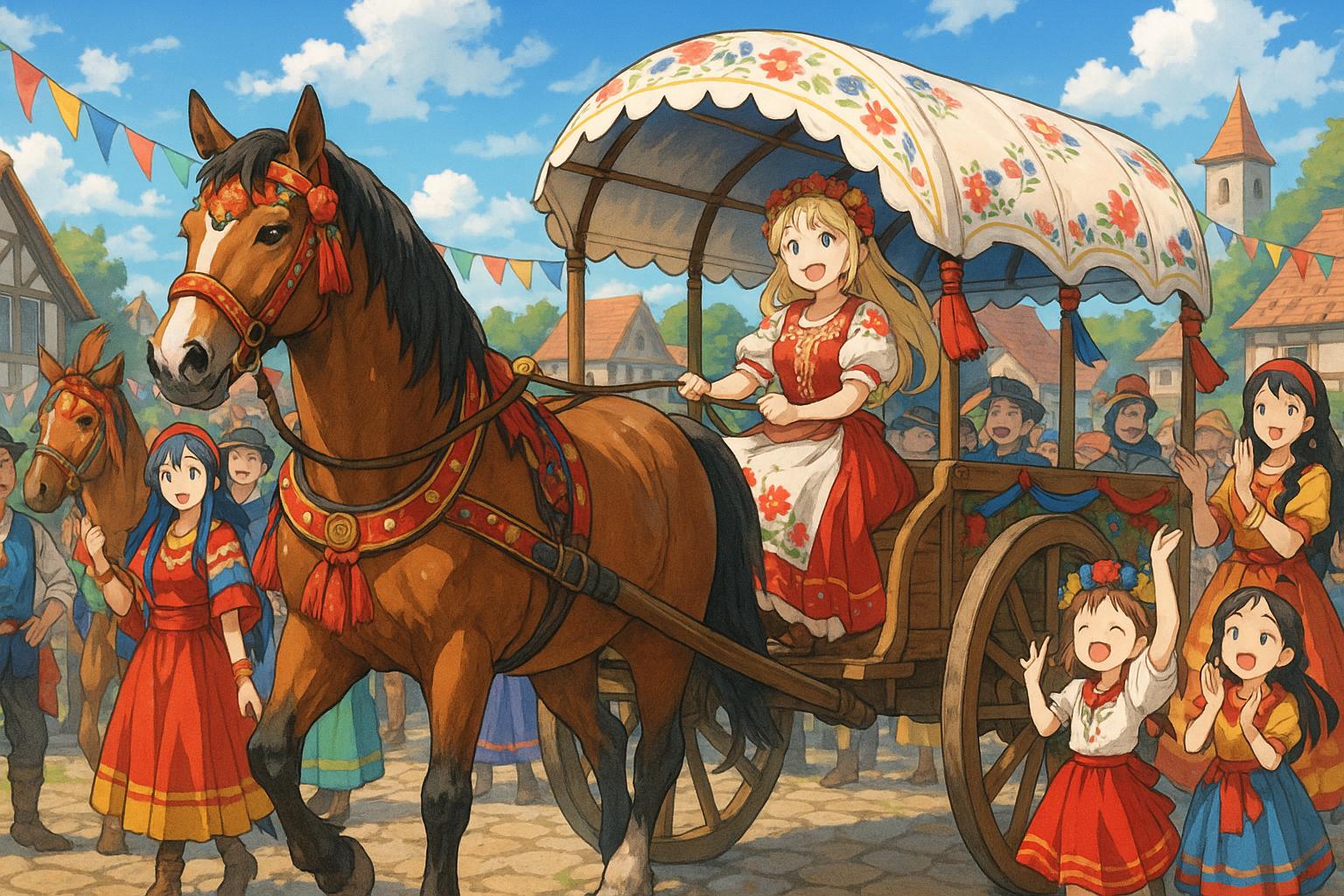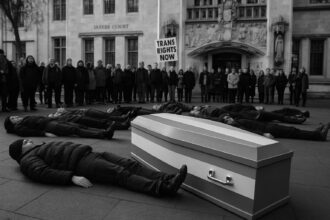As thousands gather in Appleby-in-Westmorland for the 250th edition of Europe’s largest traditional horse fair, authorities and residents face challenges balancing cultural celebration with safety amid rising tensions and incidents.
As thousands of travellers gather in Appleby-in-Westmorland for the annual Appleby Horse Fair, the local community is bracing for the expected influx of around 10,000 participants. The event, which spans six days, traditionally attracts not only the Gypsy, Roma, and Traveller communities from across Europe but also approximately 30,000 visitors, turning the quiet town into a hub of activity and celebration.
This year marks the 250th anniversary of the fair, renowned as Europe’s largest traditional gathering of the community. Billed as a vibrant display of horse riding, trading, and cultural festivities, the fair features traditional music, dance performances, and a variety of shopping stalls, underscoring its historical significance. However, as the event approaches, tensions are palpable among residents, many of whom have grown accustomed to the disruption that accompanies the fair.
Footage circulating on social media shows caravans racing down narrow streets, causing significant traffic delays. Intriguingly, a toddler was captured riding on a horse, illustrating the deep-rooted traditions that persist within these communities. Local tradition also includes washing horses in the River Eden, a ritualistic practice meant to prepare the animals for sale.
Despite the festive atmosphere, the build-up to the fair has been marred by incidents of antisocial behaviour. Cumbria Police reported nearly 30 arrests ahead of the fair due to offences such as burglary, criminal damage, and racist abuse. Critically, one incident involving the handcuffing of two young boys has sparked outrage, with the children’s mother vocally condemning the police’s actions. Speaking publicly, she described the situation as “pure abuse of power” that exacerbates fear among children from the travelling community.
Local authorities and police have been actively preparing for the numerous challenges posed by the fair. A focus on improving safety measures has been underscored by a recent report released by the Appleby Horse Fair Multi Agency Strategic Coordination Group (MASCG), which cautioned against formalising the event into a licensed and ticketed festival. Instead, it suggested enhancing management to address issues like early arrivals and disruptive behaviour, rather than attempting to regulate the fair more stringently.
In response to community feedback, the Westmorland and Furness Council has secured funding for various initiatives aimed at improving safety. Measures include the construction of a new footway, improved signage, and traffic calming solutions to accommodate the slow-moving horse-drawn vehicles that are integral to the fair’s character. Detective Superintendent Dan St Quintin of Cumbria Police highlighted the importance of public safety, urging motorists to remain cautious as the festivities unfold.
While the fair’s origins trace back to 1775, evolving from a cattle and sheep trading event, the modern iteration has transformed into a gathering of cultural significance that attracts families from across the UK and beyond. Historically, the event has faced cancellations only twice, underscoring its entrenched status within both the local culture and the broader travelling community’s identity.
As the fair officially opens on June 5 with main activities running through the weekend to June 11, the atmosphere remains charged with both anticipation and anxiety. Locals are hopeful that, despite reservations and past incidents, this year’s fair can celebrate a rich cultural heritage while ensuring the safety and enjoyment of all involved.
 Reference Map:
Reference Map:
- Paragraph 1 – [1], [2]
- Paragraph 2 – [3], [5]
- Paragraph 3 – [4], [6]
- Paragraph 4 – [2], [7]
- Paragraph 5 – [1], [5]
- Paragraph 6 – [1], [2]
Source: Noah Wire Services
- https://www.dailymail.co.uk/news/article-14782639/Thousands-Travellers-Gypsies-Appleby-horse-fair.html?ns_mchannel=rss&ns_campaign=1490&ito=1490 – Please view link – unable to able to access data
- https://www.travellerstimes.org.uk/news/2025/03/appleby-fair-will-not-become-licensed-and-ticketed-festival-says-new-report – An independent report published in March 2025 advises against transforming the Appleby Horse Fair into a licensed and ticketed event. Commissioned by local councils and the Appleby Horse Fair Multi Agency Strategic Coordination Group (MASCG), the report suggests that the fair should remain ‘a large informal and often spontaneous gathering.’ It highlights the challenges of regulating the event and recommends better management to address issues like early arrivals and antisocial behaviour, rather than attempting to formalise the fair into a ticketed festival.
- https://applebyfair.com/appleby-horse-fair-2025/ – The official website for the Appleby Horse Fair 2025 provides essential information for attendees. The fair is scheduled from Thursday, 5 June to Wednesday, 11 June 2025, with the main activities taking place on Thursday through Sunday. The site offers tips for visitors, including accommodation recommendations, attire suggestions for unpredictable weather, and insights into the fair’s cultural significance. It also details the event’s location, transportation options, and what attendees can expect, such as horse trading, competitions, traditional music, and local cuisine.
- https://www.newsandstar.co.uk/news/24218303.extra-safety-measures-implemented-ahead-appleby-horse-fair/ – Ahead of the 2025 Appleby Horse Fair, Westmorland and Furness Council has secured funding to implement additional safety measures. These include traffic calming for horses, improved signage, and the construction of a new footway. The initiatives aim to enhance safety for both residents and visitors during the fair. The funding, sourced from the council’s Integration and Improvement Fund, addresses community feedback from the previous year’s event and has been approved by the Multi-Agency Strategic Coordination Group (MASCG).
- https://applebyfair.org/home-page – The official homepage of the Appleby Horse Fair provides comprehensive details about the annual event. Scheduled for 5–11 June 2025, with main activities on Thursday through Sunday, the fair is a significant gathering of Gypsies and Travellers in Appleby-in-Westmorland. The site offers information on the fair’s history, cultural significance, and the various activities that take place, including horse trading, traditional music, and dance performances. It also provides updates on pre-fair events and community engagement opportunities.
- https://www.newsandstar.co.uk/news/24550881.say-2025-appleby-horse-fair-drop-in-sessions/ – The Multi-Agency Strategic Coordinating Group (MASCG) has scheduled drop-in sessions to discuss the 2025 Appleby Horse Fair. These sessions aim to engage the community and ensure the event is safe and enjoyable for both residents and visitors. The drop-in sessions are set for various dates and locations, including Appleby Library and Kirkby Stephen Local Links. Community members are encouraged to attend to share their views and contribute to the planning process for the upcoming fair.
- https://cumbriacrack.com/2025/05/02/appleby-horse-fair-2025-gypsies-and-travellers-urged-not-to-arrive-too-early/ – As the 2025 Appleby Horse Fair approaches, Gypsies and Travellers are being urged not to arrive too early to prevent congestion and difficulties in surrounding areas. The Multi-Agency Coordinating Group (MASCG) emphasizes the importance of planning travel to avoid early arrivals, which can lead to limited stopping places and potential disruptions. Community leaders, including Billy Welch, stress the need for careful travel planning and caution on the roads to ensure a safe journey for all participants.
Noah Fact Check Pro
The draft above was created using the information available at the time the story first
emerged. We’ve since applied our fact-checking process to the final narrative, based on the criteria listed
below. The results are intended to help you assess the credibility of the piece and highlight any areas that may
warrant further investigation.
Freshness check
Score:
8
Notes:
The narrative is current, published on June 5, 2025, coinciding with the start of the Appleby Horse Fair. The event is scheduled from June 5 to June 11, 2025. ([applebyfair.org](https://applebyfair.org/home-page?utm_source=openai)) The report includes recent developments, such as increased safety measures and community concerns, indicating freshness. However, some information, like the fair’s history and traditional activities, is well-established and may be recycled. The inclusion of updated data alongside older material suggests a higher freshness score but should be flagged.
Quotes check
Score:
7
Notes:
The report includes direct quotes from local authorities and community members. A search reveals that similar statements have been made in previous years, indicating potential reuse of content. For instance, calls for fair-goers not to arrive too early have been echoed in prior reports. ([cumbriacrack.com](https://cumbriacrack.com/2025/05/02/appleby-horse-fair-2025-gypsies-and-travellers-urged-not-to-arrive-too-early/?utm_source=openai)) Variations in wording are present, but the core message remains consistent. The lack of entirely new or exclusive quotes suggests a moderate originality score.
Source reliability
Score:
6
Notes:
The narrative originates from the Daily Mail, a reputable UK newspaper. However, the report includes information from various sources, including local authorities and community representatives. While these sources are verifiable, the narrative’s reliance on a single outlet raises some uncertainty. The inclusion of multiple perspectives enhances credibility but also introduces potential biases.
Plausability check
Score:
8
Notes:
The claims about the Appleby Horse Fair’s schedule, attendance, and activities align with known facts. The report mentions increased safety measures, such as traffic calming and new signage, which are consistent with previous initiatives. ([newsandstar.co.uk](https://www.newsandstar.co.uk/news/24218303.extra-safety-measures-implemented-ahead-appleby-horse-fair/?utm_source=openai)) The inclusion of community concerns and recent incidents adds depth to the narrative. However, the dramatic tone and emphasis on tensions may be exaggerated, warranting further scrutiny.
Overall assessment
Verdict (FAIL, OPEN, PASS): OPEN
Confidence (LOW, MEDIUM, HIGH): MEDIUM
Summary:
The narrative is timely and includes recent developments related to the Appleby Horse Fair. However, the reuse of quotes and reliance on a single source raise concerns about originality and potential biases. While the report’s claims are plausible, the dramatic tone may be exaggerated. Further verification of the sources and claims is recommended to ensure accuracy.













